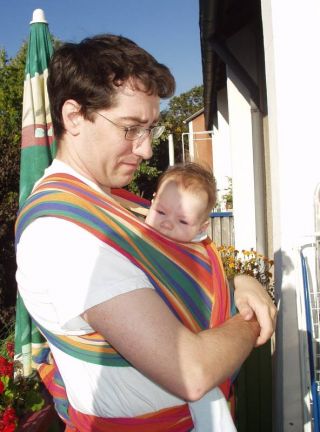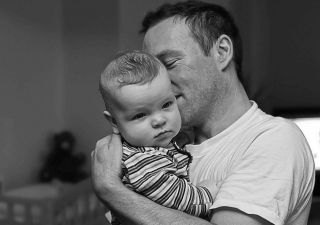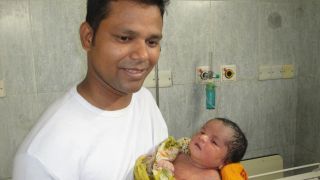Evolutionary Psychology
Mama's Baby, Papa's, MAYBE: Baby Names & Fathers' Anxieties
Namesaking plays an important role in integrating newborns into the family.
Posted August 8, 2015

During the first week of August, 2015, 19 year-old Tionna Banks left the group home for at-risk women where she was living to visit her grandmother. She had filed an order-of-protection against her 25 year-old ex-boyfriend, Cesar Mazza, and she was living in this protected environment because she feared him. Tragically, Mazza ambushed Banks at her grandmother’s house anyway, stabbing her to death and beating her 72 year-old grandmother to death. Mazza also kidnapped their 11 week-old son.
The reason for this violence? Banks had refused to name her newborn baby after the father.
At first glance, this may look like another story about “Precarious Manhood” and the violent tendencies of young men, a topic that I have written about before. However, in this case, I would like to focus on the role played by “namesaking” (i.e., the naming of a child after a parent or other relative) in negotiating the relationship between children and their kin, especially the father.
The Importance of Namesaking

Namesaking serves a variety of purposes, not the least of which is that it enhances the sense of relatedness that parents and other relatives feel toward the newest member of the family.
Namesaking a child publicly advertises the strength of the kinship between the child and its relatives, making it instantly more similar, familiar, and likable to potential caregivers.
While both parents are usually involved in the naming of children, the evidence is that, at least in the United States, the mother is the more influential parent when choosing a name (LeVine & Willis, 1994). Hence, the mother has the ability to publicly identify the father (or not) in an attempt to increase the likelihood of his sticking around and being a good provider.
For children born out of wedlock, naming the child after the father has been shown to be a remarkably strong predictor of the quality of the long-term relationship between the father and the child as reflected by the amount of contact between them and the degree of financial assistance provided by the father, and these same studies have also reported that sons with the first names as their fathers had fewer behavioral problems such as bedwetting, temper tantrums, and general disobedience and that they also scored higher on tests of cognitive skills (Furstenberg & Talvitie, 1980).
Along these same lines, a study at a social work agency in California confirmed that more than 70% of the clients of that agency were unmarried mothers who had purposively named their children after the father to encourage contact between these children and their fathers (Jankowiak & Woodman, 2002).
Mama's Baby, Papa's, Maybe -
What is it that makes fathers so “needy?”
The problem can be traced to the simple fact that mothers always know that a child is biologically theirs, but the father can only hope that this is the case and seek reassurance in any way that he can. From an evolutionary perspective, it would be quite maladaptive for a man to invest heavily in offspring that are not actually his, and male psychology has evolved to be very sensitive to cues that reassure him of paternity.
Evidence that namesaking is an attempt to increase perceptions of genetic relatedness can be found in cases of adoption where the need to integrate the child into its new kinship group can be especially pressing.
Some of my former students and I compared namesaking patterns in 96 adoptive families with namesaking patterns in 104 non-adopting families (Johnson, McAndrew, & Harris, 1991). We confirmed that adopted children are in fact more likely to be namesaked than non-adopted children and that they were more likely to be given both a first name and a middle name in honor of a relative. We also found that in non-adopting families, but not in adoptive families, children were more likely to be named after a patrilineal relative, usually the father. This did not happen in adopting families because in these families both parents were equally sure that the child was not genetically related to them.
In a follow-up study of naming patterns in 322 American families, we also discovered that namesaking was a more important issue for male children than for females. Not only were boys more likely to be namesaked than girls, the birth order of the boy was strongly related to the probability of being a namesake, whereas for girls it was virtually irrelevant. Parents were much more likely to delay namesaking until the second-born child if the first-born child was a girl (McAndrew, King, & Honoroff, 2002).
So, namesaking usually follows the path of "least confidence" of a genetic relationship. When namesaking is about reassuring fathers of paternity, it will occur most frequently in situations where the mother is uncertain of the father's continuing presence.

A study by Daly and Wilson (1982) illustrates how perceptions of newborns can be shaped by the anxiety of assuring paternity.
In videotaped recordings of 111 American births, paternal resemblance of the infant was remarked on by the mother significantly more often than was resemblance to herself. Resemblance to the father was especially likely to be perceived in first-borns, and a bias toward thinking that the baby looked like the father was even stronger in a second questionnaire study of a large number of parents who had recently given birth. Daly and Wilson also found that when a child had been named after the father before it was born, mothers were even more likely to note a resemblance, and that relatives on the mother’s side of the family were the strongest advocates for naming babies after their fathers.
In keeping with this, pregnant women commonly report that they have fantasized that their newborn baby will look like their husband (Leifer, 1977).
In a nutshell, the answer to the age-old question of “What’s in a Name?” is “a lot more than you might think.” Reassuring fathers about paternity is not the only force at play when parents are choosing the names for their children, as research has shown that other motivations can also be quite influential. However, the role played by names in fostering family bonds is an often overlooked and important part of the naming ritual.
The impulses that come into play when naming children come from a much deeper place than we are consciously aware.
[For information on other reasons why parents namesake their children, hear excerpts from an interview I did with "Doctor Radio."]
REFERENCES:
- Daly, M., & Wilson, M. I. (1982). Whom are newborn babies said to resemble? Ethology and Sociobiology, 3, 69-78.
- Furstenberg, F. F. Jr., & Talvitie, K. G. (1980). Children’s names and paternal claims: Bonds between unmarried fathers and their children. Journal of Family Issues, 1, 31-57.
- Jankowiak, W., & Woodman, C. (2002). Parental ,investment or maternal investment? A critique of the parental investment hypothesis in an American polygamous community. In H. Holcomb (Ed.), The evolution of minds: Psychological and philosophical perspectives. (pp. 271-292). New York: Academic Press.
- Johnson, J. L., McAndrew, F. T., & Harris, P. B. (1991). Sociobiology and the naming of adopted and natural children. Ethology and Sociobiology, 12, 365-375.
- Leifer, M. (1977). Psychological changes accompanying pregnancy and motherhood. Genetic Psychology Monographs, 95, 55-96.
- LeVine, M. B., & Willis, F. N. (1994). Public reactions to unusual names. Journal of Social Psychology, 134, 561-568.
- McAndrew, F. T., King, J. C., & Honoroff, L. R. (2002). A sociobiological analysis of namesaking patterns in 322 American families. Journal of Applied Social Psychology, 32, 851-854.




